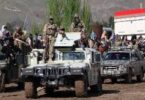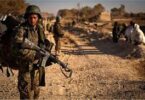KABUL (Afghanistan Time): Hundreds of women in Afghanistan’s capital Kabul marched through the city on Thursday, calling on the warring factions to reverse their previous decisions on their military plans and instead engage into the discussion for an immediate ceasefire to end the current bloodsheds.
Addressing a gathering of at least 300 women in Kabul who marched under the motto “Ceasefire for Peace”, Sima Samar, Chairperson of Afghanistan Independent Human Rights Commission, said there is a need for confidence building measures between the warring sides in the war in the country to achieve a breakthrough in the peace process.
“We want the money to be spent on addressing the treatment of diseases such as tuberculosis and polio rather than investing it in war,” Samar said.
Women’s rights activists, meanwhile, persuaded both the Afghan government and the Taliban to cancel their so-called security operations and instead work on forging consensus on a ceasefire.
“We call on the warring parties to announce a ceasefire as soon as possible,” said Frozan Rasuli, deputy head of Equality for Peace and Democracy Organization.
“This time the government should take the initiative and dissolve Khalid security plan. We also call on the Taliban to dissolve their Alfatha operation,” said Shinkai Karokhel, a women’s rights activist.
Other activities said they are ready to talk to the Taliban in any venue the Taliban chooses inside the country.
“We will go to any province that the Taliban chooses to talk to them about peace,” said Shakiba, an activist.
“No one can take the decision on behalf of the victims of war. There are families of war victims who can represent themselves,” said Wazhma Shekib, another activist.
The remarks come amid an increase in peace efforts and an escalation of conflicts in different parts of the country with the arrival of the spring.
The UN Assistance Mission in Afghanistan said in a quarterly report on April 24 that it has documented high levels of harm to civilians but adds that there has been a 23 percent decrease in overall civilian casualties as compared to the same period last year and is the lowest for a first quarter since 2013.
The report says the UN documented 1,773 civilian casualties (581 deaths and 1,192 injured), including 582 child casualties (150 deaths and 432 injured) between January 1 and March 31.
In the first quarter of 2018, UNAMA documented 2,305 civilian casualties (799 deaths and 1,506 injured), including 609 child casualties (176 deaths and 433 injured), the report says.
But on Tuesday, April 23, Afghanistan Independent Human Rights Commission said in a report that at least 11,000 civilians were killed and wounded in Afghanistan during the 1397 solar year which coincides with March 2018 to March 2019.
The figures show a 19 percent increase in civilian fatalities compared to a year before, the AIHRC said on Tuesday.
The call for a ceasefire come as Afghans experienced a short-term ceasefire between the Afghan government and the Taliban last June.
Unilateral Ceasefire
On June 12, 2018, President Ashraf Ghani announced a ceasefire with the Taliban after more than 2,000 Afghan religious scholars from around the country issued a fatwa, an Islamic directive, in which they described the “the ongoing war in Afghanistan is forbidden under Islamic law”.
On June, 16, 2018 Ghani said in an address to the nation said that the temporary ceasefire between government and Taliban has been warmly welcomed by the people and that he has ordered the security forces to extend the ceasefire.
Ghani said the current ceasefire will be extended from the fourth day of Eid. He however did not give any further details.
“I ordered the security and defense forces to extend the ceasefire from the fourth day of Eid-al-Fitr. The details about the extended ceasefire will soon be shared with the people. But I order the forces across the country to be ready for any attack to defend the country and the people,” said Ghani.
On June 9, 2018, the Taliban issued a statement that it has ordered its fighters not to clash with Afghan security forces for the first three days of Eid.
The Taliban’s favorable response comes after President Ashraf Ghani on Thursday announced a ceasefire with the Taliban.
In the statement sent to the media early Saturday, the Taliban said its fighters would not launch attacks against Afghan security forces but that they would defend themselves if necessary.
Ceasefire Widely Welcomed
Major partners of Afghanistan welcomed the announcement of a unilateral ceasefire by calling it a positive step towards peace.
US Department, NATO’s Resolute Support Mission and US forces in Afghanistan, Federica Mogherini, High Representative of the European Union for Foreign Affairs and Security Policy, UK Foreign Secretary Boris Johnson, NATO Secretary General Jens Stoltenberg and the United Nations Assistance Mission in Afghanistan (UNAMA) and Russian foreign ministry all together welcomed the announcement of the ceasefire.
On June 30, 2018, President Ghani announced the end of the ceasefire and ordered security forces to resume operations across the country.
Ghani emphasized that government was working hard to achieve peace but that it had no plans to hand over territory to the Taliban.
In a reciprocal move on June 18, 2018, Taliban announced end of their ceasefire and ordered all their fighters to resume fighting.






